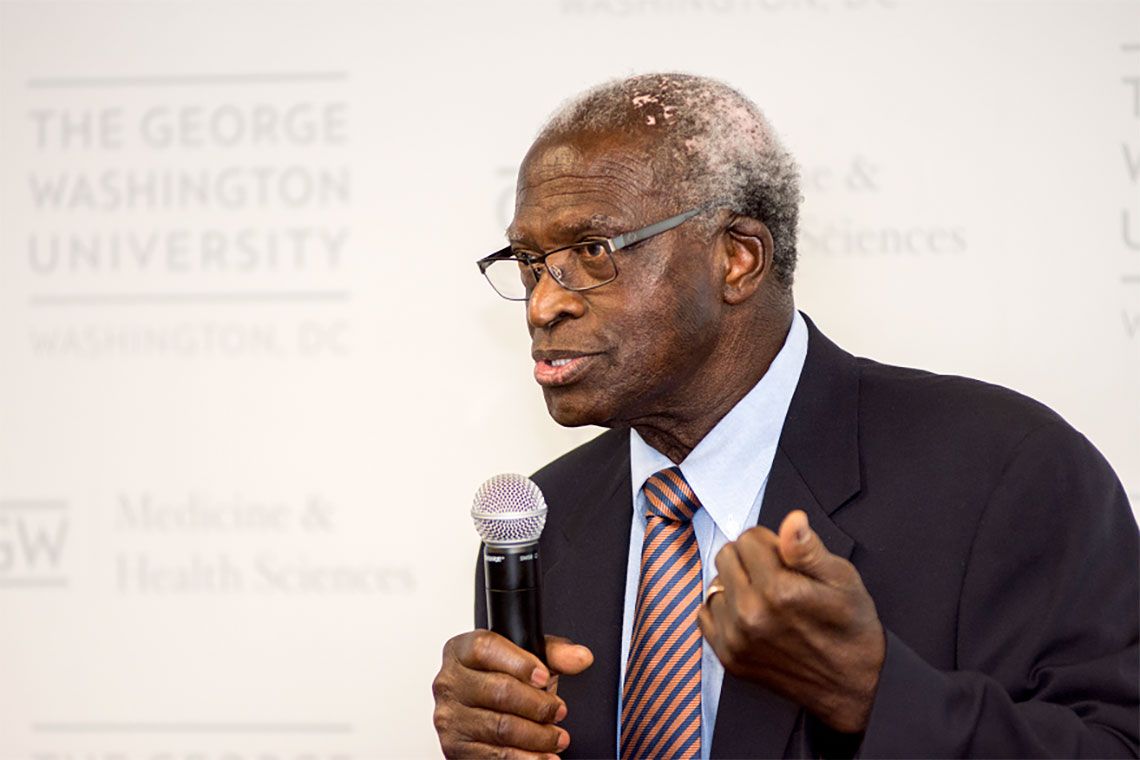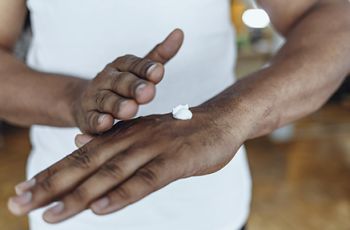
The story of Cecil Jonas, M.D. ’65, and his visit with students from the George Washington University School of Medicine and Health Sciences (SMHS), began with Grace Henry, Ed.D., director of the Office of Diversity and Inclusion. On a fact-finding mission to unearth the first African-American medical student to graduate from SMHS, Henry paged through aged yearbooks in the University Archives. The first student, James Edwin Jackson, M.D. ’59, M.P.H., a renowned obstetrician and gynecologist, passed away in 2013. The second student, however, was alive and well and, importantly, available.
“He told me, ‘Well, I’m going to be on campus for Alumni Reunion Weekend, as long as I’m not dead,” Henry recalled with a laugh. “I find his story to be so compelling as to how he got to GW, how he made it really being the only person that looked like himself at that time. I said, ‘I think our students can truly benefit from hearing this story.’”
So Jonas, attending his 50th reunion in late September, stood before a crowd of eager listeners to tell his story. A native of Guyana, Jonas left home for Howard University, where he studied biophysics. “It was the most productive, interesting, and progressive relationship,” he said. Following three years of study and a year of research, Jonas hedged away from working for a government (“I tend to have my own opinions on how things should be done,” he explained) and considered medical school.
“I liked meeting people, interacting with them, getting to know them,” he said. “Medicine, interestingly enough, was not by itself of significant interest to me. What was interesting to me was to have a chance to help people who otherwise would not have been able to access the system.”
He applied to five schools; GW was the first to interview and accept him. “I must say that I made it quite clear from entering GW that money could be an issue,” Jonas explained, adding that a GW faculty member stepped in to secure scholarship funding. “I did well in medical school, and I received a very, very superb medical education at GW. It was stressful, yes, but very tolerable compared to some of the stories I’ve heard from other schools. The problem came at GW with social interaction.”
As the sole minority in his class at the height of the civil rights movement, Jonas recalled that most students hadn’t spent much time around “blacks, especially ones who speak funny.” Although he formed close bonds with the members of his cadaver team, assimilating into medical school was, he said, stressful. Complicating his experience, and his journey to becoming an OB/GYN, was societal racism bleeding into the hospital environment.
“When I came along, black OB/GYN males could not take care of white females,” he said. His solution lay in his attitude and his approach to patients who needed care. “Yes, there are going to be obstacles, but be prepared to handle them,” Jonas said. “Don’t get angry; just say, ‘well, I’m here to take care of you, I’m here to do 1, 2, 3, 4.’ And if she says she prefers to see another physician, then walk out. And make a note that this patient refuses to be seen by me. That’s how I handled it. Maybe there’s a better way, but that worked for me.”
Jonas went on to practice medicine for 45 years, first in Detroit, and then in Florida. But for his rapt audience, his experience in medical school served as a lesson for those fighting to succeed. During a question-and-answer session, Jonas discussed his motivation for matriculating from SMHS, dealing with lowered expectations and racism in medical education curriculum, and the need to encourage more minorities to pursue careers in the health sciences.
“I decided, in order to deal with inequalities, I’d show that I wouldn’t take a backseat to anyone else: male, female, white, black, Indian, blue, green, whatever,” Jonas said. “I just made sure that, intellectually, I knew what I was talking about, and I did talk. Each one takes his own path. The challenges will be there; they’re not going to go away.”
His advice, besides persistent pushing for success, traces back to the Bard: “If I were to give you any advice, I would say be true to yourself. Shakespeare said it a long time ago: to thine own self be true.”


